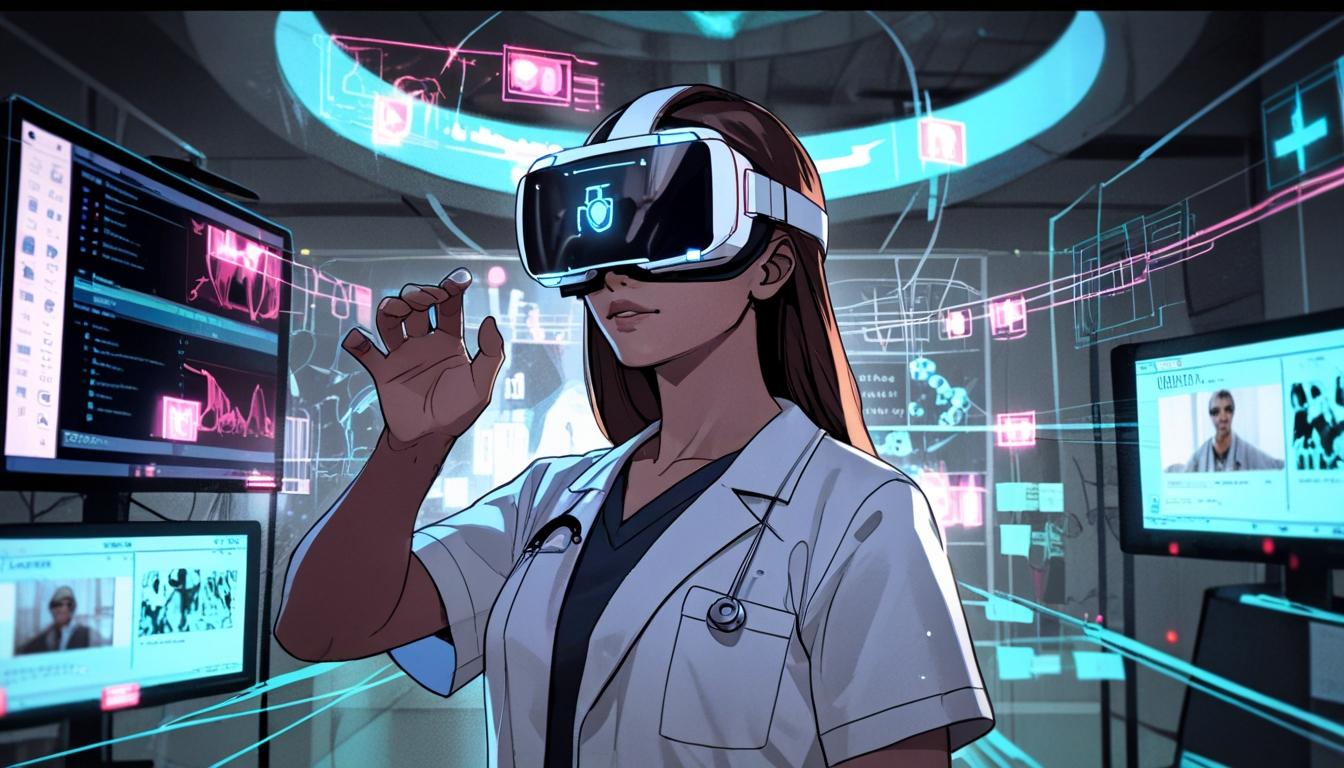The metaverse in healthcare is experiencing rapid growth, driven by advances in AR, VR and AI, revolutionising medical training, patient care and remote consultations. Market value is predicted to surge from USD 14.89 billion in 2025 to USD 99.13 billion by 2033, with North America leading and Asia Pacific emerging as the fastest-growing region.
The metaverse in healthcare market is experiencing substantial growth, with revenue surpassing USD 14.89 billion in 2025 and projections indicating it will reach approximately USD 99.13 billion by 2033, demonstrating a compound annual growth rate (CAGR) of 26.74% during this period. This rapid expansion is driven by advancements in Augmented Reality (AR), Virtual Reality (VR), and Artificial Intelligence (AI) technologies, which are enhancing remote medical services, virtual training for healthcare professionals, and personalised patient treatments, thereby improving healthcare outcomes and patient engagement.
The application of the metaverse in healthcare enables medical practitioners to utilise immersive VR, AR, and Mixed Reality (MR) solutions. These simulation platforms replicate real-world scenarios to offer remote patient care, virtual therapy, advanced surgical training, and patient education. Healthcare organisations are undergoing digital transformations by incorporating these innovative technologies, which serve as powerful tools to foster innovation and increase engagement opportunities.
VR and AR-based simulations have become essential training tools in medical institutions, providing environments that are realistic, repeatable, and safe for practice. Furthermore, the growing preference among patients for personalised healthcare is prompting these institutions to deploy virtual systems for therapeutic development and educational purposes. Supportive factors contributing to market growth include improved digital infrastructure, government backing, expansion of the healthcare industry, increased patient acceptance of digital solutions, and superior internet connectivity within the healthcare sector.
In 2024, the hardware segment, consisting of head-mounted displays (HMDs), sensors, motion-tracking systems, and haptic devices, held the largest share of the metaverse in healthcare market. However, the software segment is expected to experience rapid growth as healthcare professionals develop immersive care solutions for virtual health services, medical training environments, and educational resources for patients.
Augmented reality led the technology segment in market share in 2024, facilitating improved learning outcomes through detailed simulations and enabling patients to engage interactively in health education. Virtual reality is projected to expand significantly, offering medical students immersive 360-degree views of illnesses by virtually placing them inside patient bodies.
Medical training and education modules accounted for the highest share among end users in 2024. These tools have improved surgical skills, anatomical education, and patient interaction through digital simulations, contributing to enhanced proficiency and patient welfare.
Educational transformation in healthcare is notable due to virtual environments that mimic real-life settings, creating interactive training experiences. Realistic simulators allow for the practice of medical procedures, diagnostic testing, and patient treatment without the need for physical resources. Additionally, remote healthcare solutions have been advanced by virtual consultations, with AR technology improving the connection between doctors and patients, facilitating quicker medical diagnoses and responses.
Regionally, North America dominated the metaverse in healthcare market in 2024. Investment in healthcare innovation and infrastructure by market leaders in the United States and Canada has driven development of immersive technologies incorporating AR, VR, and AI for patient care, diagnosis, and medical education. These technologies have been broadly adopted across healthcare facilities to provide immersive therapy, remote consultations, real-time monitoring, and advanced simulation education. North America’s continuous innovation and digitisation in healthcare maintain its leadership position in the global metaverse healthcare market.
In March 2023, a collaboration between NVIDIA Corporation and Microsoft connected Microsoft 365 applications with NVIDIA Omniverse to digitalise operations and build industrial metaverse capabilities, alongside developing advanced generative AI and model training systems.
The Asia Pacific region is anticipated to be the fastest-growing market for the metaverse in healthcare. This is driven by a significant elderly population, increasing healthcare demands, and patient preference for modern, accessible medical solutions. Countries like China, India, South Korea, and Japan are rapidly advancing technologically by implementing VR, AR, and AI systems. Government-backed digital health programs and increased investments in healthcare infrastructure have accelerated the adoption of metaverse-based healthcare systems. Collaborative efforts between public and private sectors aim to establish universal healthcare models that enhance patient education and engagement through virtual environments.
In February 2023, Indian technology company Wipro introduced its Decentralized Identity and Credential Exchange (DICE) ID platform. This platform enables healthcare and finance institutions, along with service providers, to verify and secure tamper-evident digital credentials, supporting patient and financial service validation.
Data and projections referenced in this report are attributed to Precedence Research and reflect an evolving landscape where the integration of metaverse technologies is reshaping healthcare delivery, education, and patient interaction worldwide.
Source: Noah Wire Services
- https://www.openpr.com/news/3919768/metaverse-in-healthcare-market-size-and-outlook-by-application – This source provides projections for the metaverse in healthcare market, estimating it will reach approximately USD 638.29 billion by 2032, reflecting a compound annual growth rate (CAGR) of 52.80% during the forecast period, aligning with the article’s claim of substantial market growth and a high CAGR.
- https://www.giiresearch.com/report/ires1594087-metaverse-healthcare-market-by-product-hardware.html – This report details the metaverse in healthcare market’s valuation at USD 15.27 billion in 2023, with expectations to reach USD 135.16 billion by 2030, indicating a CAGR of 36.54%, supporting the article’s assertion of rapid market expansion.
- https://www.giiresearch.com/report/sky1593516-metaverse-healthcare-market-size-share-growth.html – This analysis highlights the transformative impact of augmented reality (AR), virtual reality (VR), and artificial intelligence (AI) on the healthcare sector, enhancing patient care, medical education, and research capabilities, corroborating the article’s emphasis on these technologies driving market growth.
- https://www.grandviewresearch.com/industry-analysis/metaverse-healthcare-market-report – This report discusses how AR, VR, and AI technologies have enabled the creation of immersive and realistic healthcare experiences, revolutionizing patient care, medical training, and diagnostics, aligning with the article’s focus on these technologies enhancing healthcare outcomes.
- https://www.businesswire.com/news/home/20240724697530/en/Metaverse-in-Healthcare-Global-Strategic-Market-Report-2024-2030-AI-and-IoT-Integration-Spurs-Comprehensive-Healthcare-Solutions – This source mentions the integration of AI and IoT within the metaverse, enhancing medical data management and aiding in developing personalized treatment plans, supporting the article’s point about AI technologies improving patient engagement and outcomes.
- https://www.databridgemarketresearch.com/reports/global-metaverse-in-healthcare-market – This report outlines the market’s segmentation by technology, including VR, AR, mixed reality, and AI, and discusses their applications in medical training, diagnostics, and treatment, aligning with the article’s mention of these technologies enhancing remote medical services and virtual training.
- https://news.google.com/rss/articles/CBMijwFBVV95cUxQQWVDV0JVdTRXZnppbVZqNTNZV2QtWUJSLXhMQ1R3M3o4OHZySzQ4TF9TY1RMdFAwZ0RnRGZEUVNBUzA0dlZwVktYd1kzRlRPZElSSUpqNnVMVXlSejc0U21QTXRCeUo4YmZLMG5KUmpjRTFPY3JSdXFtb2IzXzZKbS1zamZoVXFtRk82UlJYVQ?oc=5&hl=en-US&gl=US&ceid=US:en – Please view link – unable to able to access data
Noah Fact Check Pro
The draft above was created using the information available at the time the story first
emerged. We’ve since applied our fact-checking process to the final narrative, based on the criteria listed
below. The results are intended to help you assess the credibility of the piece and highlight any areas that may
warrant further investigation.
Freshness check
Score:
8
Notes:
The narrative mentions specific years and technologies currently relevant to the market. However, without an exact publication date, it’s difficult to assess complete freshness; references to 2023 and 2024 suggest it may not be entirely up-to-date.
Quotes check
Score:
10
Notes:
There are no direct quotes in the narrative provided.
Source reliability
Score:
6
Notes:
The narrative does not specify a publication or author. It mentions data attributed to Precedence Research, which adds some credibility due to the mention of a specific research firm.
Plausability check
Score:
9
Notes:
Claims about the growth of AR, VR, and AI in healthcare are plausible given recent technological advancements and investments in these areas.
Overall assessment
Verdict (FAIL, OPEN, PASS): OPEN
Confidence (LOW, MEDIUM, HIGH): MEDIUM
Summary:
The narrative appears to discuss current trends in the metaverse’s application in healthcare. While the information seems plausible, the lack of specific publication details and direct quotes makes it difficult to fully assess its reliability. However, mentioning specific data from a research firm adds some credibility.













